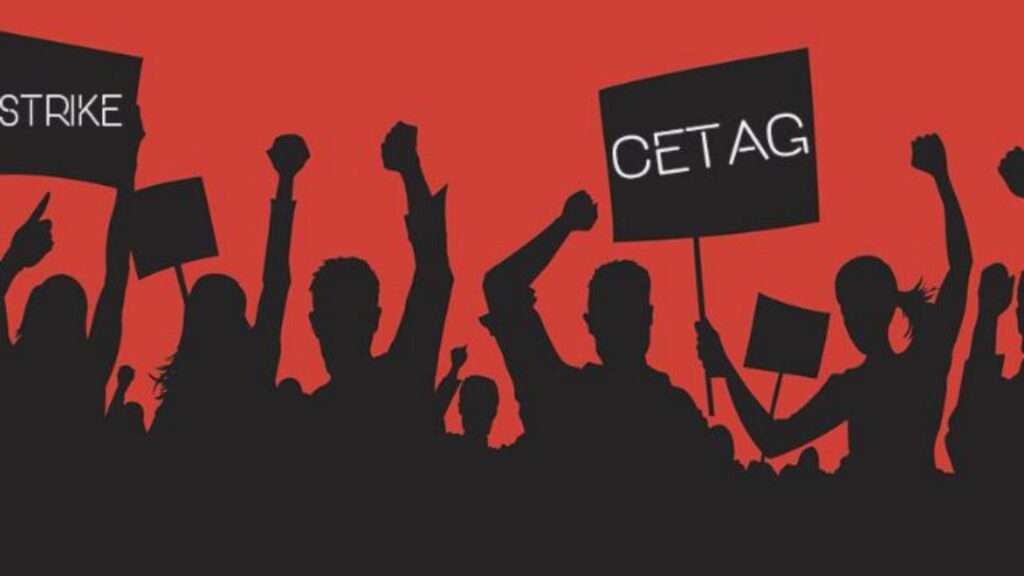Several labor unions leaders have expressed doubts, indicating that unless their longstanding demands are fully addressed, the strike that has paralyzed many educational institutions across the country will continue.
As Many unions within the education sector prepare for a critical meeting with the Minister of Education on Tuesday, October 1, growing skepticism surrounds the potential for meaningful outcomes.
George Ansong, National Chairman of the Senior Staff Association of Universities of Ghana (SSA-UoG), voiced his doubts about the effectiveness of the meeting in an interview. He expressed frustration over the slow response from the relevant authorities.
“I don’t expect anything substantial to come out of this meeting because the Ministry of Finance, which is crucial to addressing our concerns, is not directly involved.
“It has taken three weeks of strike action for the Ministry of Education to finally invite us to a meeting, which is concerning.”
George Ansong, National Chairman of the Senior Staff Association of Universities of Ghana (SSA-UoG)
Mr. Ansong further expressed frustration with the slow response from government officials, underscoring the unions’ demands for more transparency and swift action. He stressed that without clear communication from the Ministry of Finance, he did not foresee any major resolutions.
“This is not the first time we are seeing some of these things. We often attend meetings, and are promised action, but then nothing changes,” he added.
The skepticism from union leaders stems from a history of unfulfilled government commitments, particularly on issues surrounding salary arrears, pension payments, and other financial allowances.
This frustration was echoed by Salamatu Briamah, National Chairperson of the Teachers and Educational Workers Union (TEWU).
Mr. Briamah highlighted that the unions were expecting not just verbal assurances, but a formal Memorandum of Understanding (MOU) that would outline a clear timeline for implementing the agreed-upon measures.
“We have already negotiated, and the government agreed to pay us, but they have not fulfilled their commitments,” Mr. Briamah said.
“We expect an MOU that specifies that by the end of October, our allowances will be paid. Furthermore, they need to release our Tier Two pension payments by early October.”
Salamatu Briamah, National Chairperson of the Teachers and Educational Workers Union (TEWU)
The Tier Two pension system has been a long-standing point of contention between the unions and the government. Payments under this scheme have reportedly been delayed, aggravating financial stress among staff and union members.
The unions argued that these financial delays undermine trust in the government’s willingness and ability to address their concerns.
Growing Frustration Over Government’s Approach

Michael Owusu Ansah, National President of the Ghana Association of University Administrators (GAUA), also criticized the government’s approach to resolving the crisis.
He argued that large meetings involving multiple unions with differing demands were not an effective way to address the issues at hand.
We don’t believe one meeting can solve everyone’s issues or end the strike. We will attend the meeting, but will discuss what happens with our leaders afterwards,” Mr. Owusu Ansah explained.
“We’ve been through this before, and then the government failed to honor its part of the agreement. So, we don’t think tomorrow is going to be just one of those meetings where the Minister will appeal and say we understand you, we have heard your concerns, so call off the strike, and then we will engage.”
Michael Owusu Ansah, National President of the Ghana Association of University Administrators (GAUA)
The ongoing strike, involving several key unions such as TEWU, GAUA, the Colleges of Education Teachers Association of Ghana (CETAG), and SSA-UoG, has already had a significant impact on the country’s education system.
Classes have been disrupted, research and administrative work stalled, and the overall academic calendar for many universities and educational institutions has been thrown into disarray. This widespread disruption has sparked concern among stakeholders, including parents, students, and labor experts.
The growing distrust between the unions and the government presents a significant obstacle to resolving the crisis. With the Ministry of Finance absent from the meeting, skepticism continues to grow about whether any meaningful outcomes can be achieved.
READ ALSO: Omah Lay Hails Davido Ahead of Collaboration

















